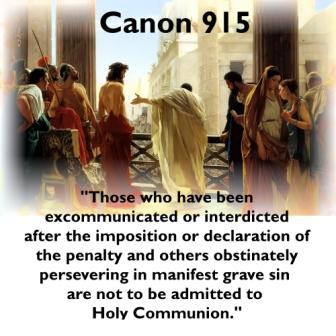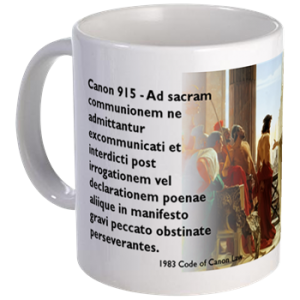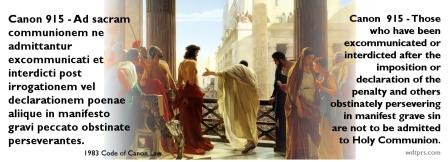The distinguished, commonsensical canonist Ed Peters has a blistering bit today at his blog In the Light of the Law. Let’s see what he has to say, with my usual emphases and comments. I’ll cut in to the meat. You should also read his intro over there:
Three ways to not deal with Canon 915
[…]
Canon 915, however, as has been explained many times, forbids the distribution of holy Communion to those who “obstinately persevere in manifest grave sin” and, because ecclesiastical tradition is unanimous that divorced-and-remarried Catholics figure among those who “obstinately persevere in manifest grave sin” (CCC 2384), this law poses a major problem for the ‘pro-Amoris’ wing. To deal with that problem, three approaches to Canon 915 have, I think, emerged.
# 1. Ignore Canon 915. This is the approach followed in Amoris laetitia itself and by, say, the Buenos Aires plan. Passing over Canon 915 in silence offers two advantages: first, the Communion-admission debate can be steered almost exclusively toward prolix discussions of personal conscience (about which there is always one more thing to say); second, bishops and pastors who, faithful to the Catholic sacramental order, affirm that holy Communion must be withheld in these cases, can do so without directly running afoul of any clear assertion in Amoris. But see # 3 below.
# 2. Belittle Canon 915. This approach marks most essays by amateurs and appears variously as a patronizing tsk-tsking of any benighted enough to think that law has something to do with life, or nigh-on clueless comments about the canon, and occasionally old-fashioned ridicule of canon law. Belittling Canon 915 taps into the antinomianism now running through the Church and it appeals both to writers unequipped to discuss competently the complex matters at hand and to readers unequipped to recognize that emotion is being substituted for reason. [A good example of this approach is found in a loopy piece at Fishwrap (aka National Schismatic Reporter) by that unflagging promoter of the ordination of women Phyllis Zagano: “A few canon lawyers are waiving their law books, sputtering like motorboats, about all that. The naysayers are especially fond of Canon 915 — their ever-popular canon that denies Eucharist to people who “obstinately persevere in manifest grave sin.””]
# 3. Violate Canon 915.This is the approach recently approved by the bishops of Malta in stating that holy Communion cannot be withheld in these cases but, as noted here, their action does not run directly afoul of Amoris for the simple reason that Amoris said nothing about Canon 915. Precisely in that both # 1 and # 3 can be sustained by appeals to Amoris leads me to agree with the Four Cardinals that, on this point anyway, the ambiguity in Amoris is irresolvable and thus the document urgently requires official clarification.
That all three approaches to Canon 915 are unacceptable seems self-evident to me but I cannot reinvent my arguments for so holding every time a new name wades into this fray. I trust my writings thus far can be located by those who wish to be better informed.
[…]





































What strikes me, I think, is that even getting over the question of whether the first, sacramental, marriage was valid (the validity of a marriage is objective, rather than subjective, so it is entirely possible that a person may correctly come to the conclusion that their marriage is/was invalid)…the divorce is never what stands as the impediment to communion. Its the remarriage. A remarriage that could only have taken place either civilly, or in a non-Catholic Church. Neither of which, unless I am very much wrong, carries any inherent weight in the Church’s mind.
If the conscience of the individual permits the reception of communion, how does it not also permit validation of the subsequent union?
There is a fourth approach that may be emerging to make trouble for persons who support Canon 915.
*If* in fact the priest in the following article was suspended for dissent from Amoris Laetitia (or for dissent from misinterpretation thereof), i.e. if there is not some undisclosed dimension to this case, are we seeing quite an interesting paradox: canon law invoked to punish a priest for affirming canon law? Of course, Ed Peters points out that AL does not mention canon 915, so this characterization is not technically correct. But I think it *may* point to a fourth strategy that could be used against those who would definitively and publicly invoke canon 915 in the cases in question–resulting, in effect, in “canon law for me but not for thou”, or to put the point more dramatically, a weaponizing of canon law against people who disagree with Pope (whether or not those persons publicly invoke canon 915). Note the invocations of canon law in the document referenced here:
https://translate.google.com/translate?sl=auto&tl=en&js=y&prev=_t&hl=en&ie=UTF-8&u=http://adelantelafe.com/exclusiva-suspendido-divinis-sacerdote-colombia-discrepar-francisco/
Interesting, since I thought those who interpreted AL as permitting an illicit practice (as does this bishop?) were antinomian, i.e. they don’t care about canon law, which is “rigid” and something promoted by the “doctors of the law”.
The profession of canon law is now under attack. Imagine trial or patent or other types of attorneys belittled in the same manner, to use a secular analogy. Ed Peters is to be thanked for his continuing efforts to clarify canon law for non-canon lawyers.
Would that canon lawyers as a group issue a declaration about this unfolding situation.
And in sum, imagine this crude analogy: an individual driver being allowed to “discern”, with “accompaniment” by legal officials, whether they are going to abide by traffic laws.
Dr Peters,
I believe in the editorial I wrote this week for VaticanInsider, I addressed canon 915 in a way that does not belittle or ignore it. I also dealt with the issue of conscience from the teaching of Cardinal Ratzinger. It is false to suggest that the Pope is allowing uninformed consciences to decide. Truth applies in every situation, thus for some who cannot prove their first marriage was invalid but in their conscience they were not-as Pope Benedict XVI accepted- justice demands that they should not be barred from the Sacraments. I would also suggest your point about public behaviour in this day and age for the most part is irrelevant. Parishes by and large are not tiny cells anymore where everyone knows the secrets of everyone else, and besides, I believe most Catholics are fully aware of the mess in many lives and that makes them much less judgemental than perhaps in previous generations. Pope Francis also said those who flaunt their objective state of sin are placing themselves in danger of being separated from the community. Those are not the words of a Pope who is giving the green light to everyone. Canon 915 in the “manifest” area could be easily resolved by pastors suggesting those in danger of creating scandal go to a parish where they are not known. Lets not forget Cardinal Ratzinger stated in “Salt of the Earth” that even if the principles have been decided on this issue, “factual questions, individual questions are of course always possible” Thus he left the door open that Holy Communion was possible in certain cases. Its easy to claim this is liberals v traditionalists, but I wrote that piece as a Conservative Catholic who cried his eyes out at the funeral of John Paul II and basked in the brilliance of Benedict XVI’s homilies. http://www.lastampa.it/2017/01/22/vaticaninsider/eng/documents/amoris-laetitia-where-truth-and-mercy-embrace-j7Wra0gHXbMppRm8A7CsRL/pagina.html
Stephen Walford
The issues involved in Canon 915 are being confused with issues of conscience. See this posting:
https://canonlawblog.wordpress.com/2015/11/20/toward-informed-discussion-of-the-internal-forum/
And I am convinced, having spent far too much time following all the trends in this pontificate from day one, that there is a reason for this. Many of those, perhaps not all, who defend Amoris Laetitia and in doing so violate, ignore, or belittle Canon 915 (to use Peters’s categories above) have much larger ambitions. This issue never was (just) about Communion for the remarried. That was just a convenient issue for introducing an anti-Catholic ideology claiming a disparity between doctrine and pastoral practice. Gotta hand it to them: the concept of the internal forum (they astutely realized) as used in canon law is so easily confused with moral conscience. And therefore exploitable for those larger designs.
This is why I think it is absolutely critical for a lay-accessible history of the internal forum concept to be written. One of those concepts for which an historical explanation will help to clear up many a misunderstanding.
Correction: meant to say un-Catholic ideology, not anti-Catholic ideology, in above, in reference to the emerging disparity between doctrine and practice. Didn’t want to suggest that I take seriously claims about Masonic intrusion in the Church, or whatever other conspiratorial theories one is fond off. That would be to ascribe motives to the opposition in the absence of evidence. But don’t be fooled: members of the German wing, Spadaro and his group, and other folks want to transform the face of Catholicism into something more akin to one or another versions of Protestantism.
A final point for now: re. the suspension of the priest in Colombia, I was careful to suggest that the full facts may not be out. *However*, if (when?) something beyond the de facto schism occurs, that is if a more formalized rift in the Church occurs, one can only imagine the creative distortions and Machiavellian uses of canon law there will be to punish or suspend those loyal to the magisterium. And maybe this particular case is just a precursor.
Hello Mr. Walford. I saw your very long essay in VI and I plan to respond to it. It’s just that there are so many people spreading so much confusion, I can’t get to all of them as quickly as I would like. Sincerely, Dr. Peters.
Reading all of these articles and comments, makes me feel as if I am in my second year at canon law school. This Pope is as wrong as Martin Luther was, in proclaiming that the Epistle of James, which said, good works are necessary for salvation, was an Epistle of straw. How do you deal with dictatorial fiats? We can argue all we want to, but you can’t fix stupid. Our only hope is that the traditional orders such as FSSP, and many others like them, rise to prominence. From them and only them is our destiny. All the rest is rearranging the deck chairs.
. . . this , from a lady who is standing on a leaf in the middle of the ocean. And I wish it weren’t true, but it gets even funnier :It almost appears as if Ms. Zagano knows as much about spelling as she does about Canon law. I went to the website to make sure Fr. Z’s quote is exact (and it is).
Canon lawyers “waiving ” their law books (LOL).
I just want to point out much of the “cry for mercy” rests on false premises such as when Ms. Zagano states:
“The person whose spouse disappeared years ago has no way of obtaining an annulment. ”
This is just plainly false. As someone who actually went through the “torture chamber”* of an annulment, my putative wife flatly refused to respond to any of the questions of the tribunal. This did complicate things and delay things, but it did NOT make it in any way impossible.
I think its high time those people who have actually gone through an annulment and who still are faithful to the traditions and teachings of the church speak up and dispel such mendacity.
Zagano and others are using these false premises, and other misunderstandings to cloud and confuse the issue.
*(While it was painful though, the annulment could better be called an extended confession over four years, forcing me to see in my own self the things that made the marriage null. Annulments, like confession are painful sometimes, but end in supreme and pure joy of release from sin.)
“I just want to point out much of the “cry for mercy” rests on false premises such as when Ms. Zagano states:
“The person whose spouse disappeared years ago has no way of obtaining an annulment. ”
This is just plainly false.”
These sorts of glaring factual errors are par for he course for Ms. Zagano.
Dear Stephen Walford,
Thanks so much for the link to your editorial in VI. A very clear exposition of the courage and authenticity of pope Francis.
The situation reminds me of the Jansenist crisis. Writers such as Dr Peters remind me of what the Catholic Encyclopedia labels as “duped Jansenists” or “quasi-Jansenists”. They are well meaning but put themselves above the pope in their zeal for rigorism.
We’ve all made homonym errors like one the Fr. Z spotted in Phyllis Zagano’s outburst against canon law, but hers is pretty funny and occasions a bumper sticker idea…
CANON 915: WAVE IT! DON’T WAIVE IT!
btw, I replied to Walford, here: https://canonlawblog.wordpress.com/2017/01/25/maybe-adjusting-canon-915-is-not-such-a-good-idea-after-all/
Daniel W, we don’t live in a time of too much moral rigorism, but rather too much subjectivism, utilitarianism and relativism.
Thanks scout. So that makes moral rigorism ok then?
Interesting logic: let’s encourage or at least ignore moral rigorism to balance all the laxism.